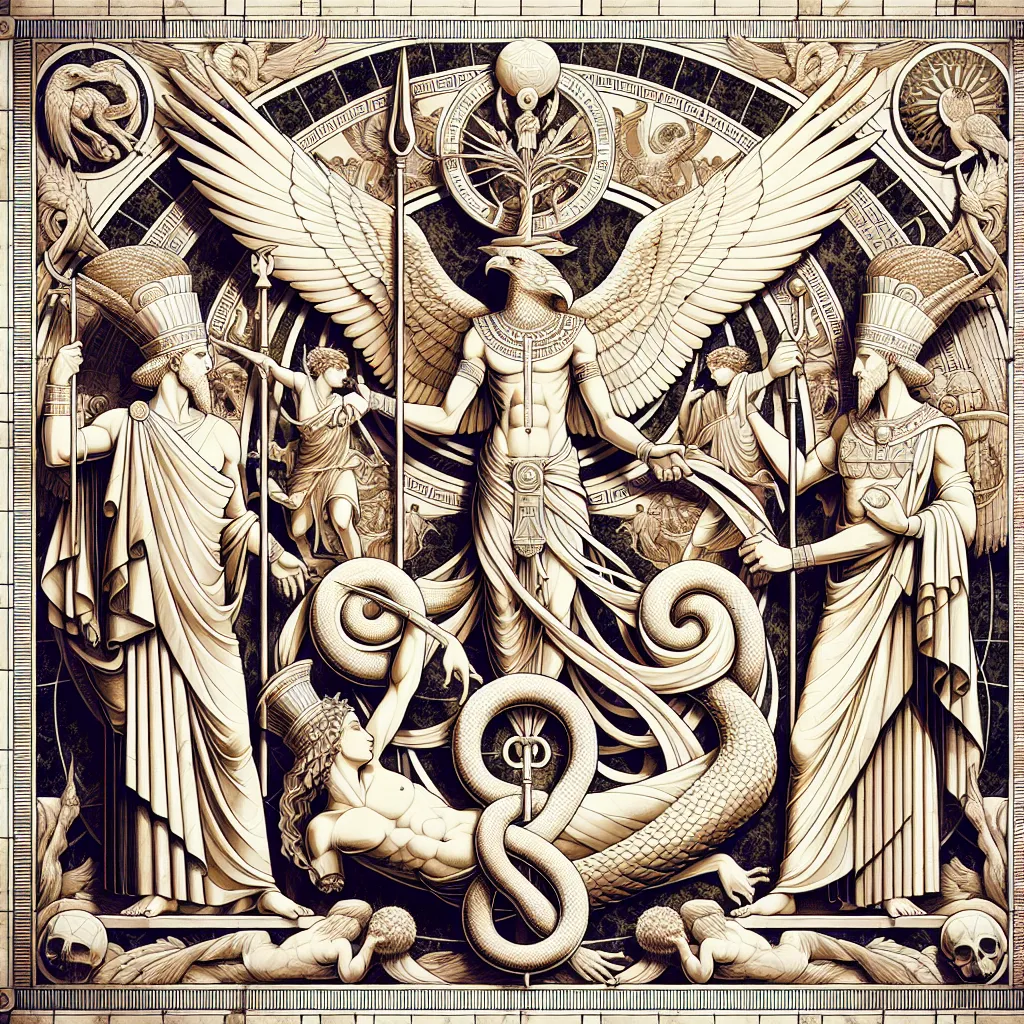
- Published on
- Authors

- Name
- You
Thoth and Hermes Trismegistus: The Syncretism of Deities
"As above, so below." — Hermes Trismegistus
The merging of Thoth, the Egyptian god of wisdom, and Hermes Trismegistus, the Hellenistic embodiment of wisdom and alchemy, forms a rich tapestry of esoteric knowledge that has profoundly influenced Western magic and Hermetic philosophy. This syncretism reflects a fascinating blend of ancient science and mystical wisdom, providing a timeless legacy of spiritual and intellectual exploration.
Origins and Attributes
Thoth: The Egyptian Scribe
Thoth, known as Djehuti in ancient Egypt, was depicted as a man with the head of an ibis or a baboon. As a deity of wisdom, writing, science, and magic, Thoth was believed to have invented hieroglyphics and acted as a scribe for the gods.
| Attribute | Description |
|---|---|
| Domains | Writing, wisdom, science, magic |
| Symbols | Ibis, baboon, writing tools |
| Mythological Roles | Mediator of divine disputes, inventor of hieroglyphs, record-keeper of the gods |
Hermes Trismegistus: The Thrice-Great
Hermes Trismegistus, a syncretic figure combining aspects of the Greek god Hermes and the Egyptian Thoth, is regarded as the founder of Hermeticism. His teachings are encapsulated in a collection of texts known as the Hermetica.
| Attribute | Description |
|---|---|
| Titles | Thrice-Great (Trismegistus) |
| Domains | Alchemy, astrology, theurgy, philosophy |
| Works | Hermetica, Emerald Tablet |
Syncretism: A Union of Divinity
The cultural intersections of Hellenistic Egypt during the Ptolemaic dynasty allowed for a unique fusion of Greek and Egyptian religious thought. This period saw the creation of Hermes Trismegistus as a syncretic deity embodying the combined wisdom of both cultures.
Key Concepts
- Hermeticism: This philosophical system blends Greek Platonic thought and Egyptian spiritual traditions, emphasizing the pursuit of gnosis (knowledge) and the unity of the divine and the cosmos.
- Emerald Tablet: Attributed to Hermes Trismegistus, this cryptic text contains the foundational principles of alchemy, famously summarized in the axiom "As above, so below."
Influence on Western Esotericism
The combined wisdom of Thoth and Hermes Trismegistus has had a lasting impact on various esoteric traditions and spiritual movements in the West.
Renaissance Revival
During the Renaissance, Hermetic texts significantly influenced scholars and philosophers. Notably, figures like Marsilio Ficino and Giovanni Pico della Mirandola integrated Hermetic and Platonic ideas into their works, fueling a resurgence in esoteric and mystical studies.
Modern Occult Practices
In contemporary spirituality and occultism, the teachings of Hermes Trismegistus continue to inspire practices in:
- Alchemy: Beyond material transmutation, alchemy remains a potent symbol of inner transformation and spiritual purification.
- Astrology: Hermetic principles underscore much of astrological theory, linking celestial movements to earthly events.
- Theurgy: Ritual practices seeking to invoke and connect with divine energies often draw from Hermetic ritualism.
Closing Thoughts
The syncretism of Thoth and Hermes Trismegistus represents more than just a blending of two deities; it is a convergence of diverse streams of knowledge forming a profound philosophical system. This legacy of wisdom bridges the gap between ancient religions and modern spirituality, continuing to offer rich insights to seekers of hidden truths.
The enduring message of Hermes Trismegistus, encapsulated in the phrase "As above, so below," reminds us of the interconnectedness of all things, encouraging a harmonious balance between the seen and unseen, the material and the spiritual.
For further exploration, delve into the primary texts of the Hermetica, and consider how their principles can be applied to contemporary spiritual practice and philosophical inquiry.
